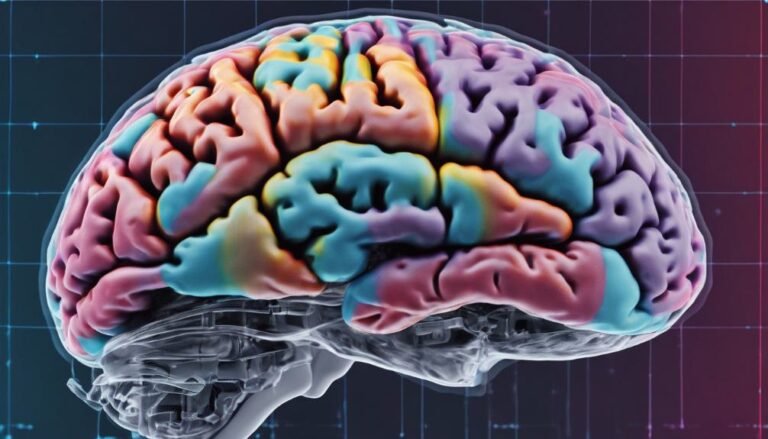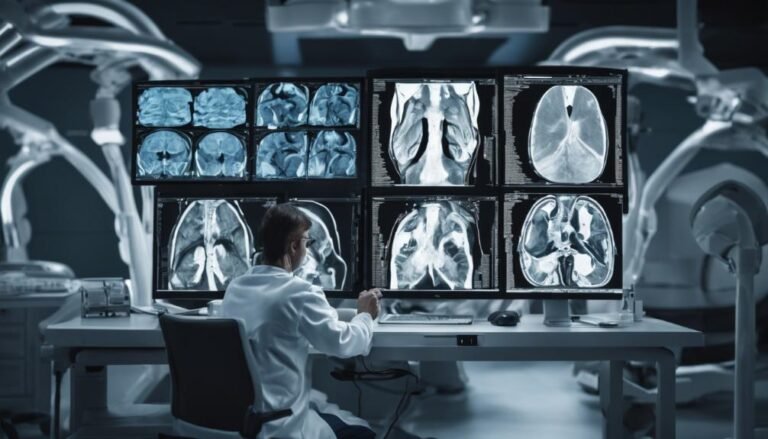AI in Health Informatics Education
Incorporating AI into Health Informatics Education may seem like a modern addition, but its impact goes beyond mere innovation. Discover how AI tools are reshaping the landscape of healthcare education, equipping students with skills that transcend traditional learning methods. From personalized approaches to ethical considerations, the intersection of AI and health informatics holds promise for the future of healthcare professionals. Explore the evolving role of AI in shaping the next generation of informed healthcare leaders.
Key Takeaways
- AI enhances hands-on learning with tools.
- AI boosts problem-solving skills.
- AI prepares students for future careers.
- AI optimizes healthcare delivery processes.
- AI offers transformative educational experiences.
Evolution of Health Informatics Education
The evolution of Health Informatics Education can be traced back to the increasing demand for skilled professionals in healthcare technology. This evolution has been driven by the need for interdisciplinary collaboration among healthcare providers, technology experts, and data analysts.
Health informatics programs have adapted to incorporate technology integration, which is essential for leveraging data to improve patient outcomes and streamline healthcare processes.
One key aspect of this evolution is the shift towards competency-based assessment in health informatics education. By focusing on the specific skills and knowledge that students need to succeed in the field, programs can better prepare graduates for the complexities of modern healthcare systems.
Additionally, experiential learning opportunities have become increasingly important in health informatics education, allowing students to gain practical experience and apply their theoretical knowledge in real-world settings.
Integration of AI Technologies
To begin with, incorporating AI technologies into health informatics education offers students a transformative learning experience that equips them with cutting-edge skills for the evolving healthcare landscape. AI integration in educational settings provides numerous benefits.
To start, students gain hands-on experience with advanced AI tools used in real-world healthcare scenarios, enhancing their problem-solving abilities and decision-making skills. By engaging with AI algorithms and predictive analytics, students learn to analyze complex datasets efficiently, leading to improved patient outcomes through data-driven decision-making.
Additionally, exposure to AI technologies prepares students for future career opportunities in healthcare informatics by staying ahead of technological advancements in the industry. This integration also fosters a deeper understanding of how AI can streamline processes, enhance patient care, and optimize healthcare delivery.
Enhancing Student Engagement
Boosting student involvement can greatly enhance the effectiveness of AI integration in health informatics education, creating a dynamic learning environment that nurtures practical skills essential for future healthcare professionals.
To achieve this, incorporating gamified learning and interactive lectures can make the educational experience more engaging and interactive. Gamified learning introduces elements like rewards, challenges, and competition, making the learning process enjoyable and motivating. Interactive lectures, on the other hand, encourage active participation through discussions, polls, and quizzes, ensuring that students remain attentive and involved throughout the sessions.
Furthermore, promoting peer collaboration fosters a sense of community among students, allowing them to learn from each other's perspectives and experiences. Real-time feedback mechanisms enable students to receive immediate input on their progress, helping them stay on track and make necessary adjustments promptly.
Personalized Learning Approaches
Utilizing personalized learning approaches can greatly enhance the effectiveness of AI integration in health informatics education by tailoring educational experiences to individual student needs and preferences. Through adaptive assessments, AI can analyze each student's strengths and weaknesses, allowing for customized learning paths. This tailored approach guarantees that students receive content at an appropriate pace and level of difficulty, maximizing their engagement and knowledge retention.
Moreover, personalized feedback provided by AI systems plays a pivotal role in guiding students towards improvement. By offering specific insights into areas needing development and highlighting achievements, students can better understand their progress and focus on areas that require attention. This real-time feedback loop fosters a supportive learning environment where students feel motivated and empowered to succeed.
Role of AI in Curriculum Development
AI revolutionizes curriculum development in health informatics by leveraging data-driven insights to tailor educational content to meet the evolving needs of learners. Through AI applications, curriculum design becomes dynamic and responsive to the latest trends in the field.
AI implementation in curriculum development involves analyzing vast amounts of data to identify gaps in knowledge, areas of improvement, and learning preferences of students. By utilizing machine learning algorithms, educational content can be personalized, guaranteeing that each learner receives the most relevant and effective information.
The educational impact of AI in curriculum development is profound. It enables educators to create adaptive learning paths, offering students personalized experiences that cater to their individual strengths and weaknesses. Additionally, AI can identify struggling students early on and provide targeted interventions to support their learning journey.
Simulation and Virtual Learning
Get ready to revolutionize your learning experience through simulation and virtual labs in health informatics education.
By immersing yourself in realistic scenarios, you can enhance your understanding and retention of complex concepts.
These interactive tools provide a safe space for practice, allowing you to develop crucial skills in a controlled environment.
Enhanced Learning Through Simulation
Enhance your learning experience in health informatics education through the utilization of simulation and virtual learning tools that provide hands-on practice and real-time feedback. Interactive scenarios and immersive simulations offer a dynamic way to engage with course material.
By immersing yourself in these simulated environments, you can apply theoretical knowledge to real-world situations, preparing you for the complexities of healthcare settings.
In these simulations, you're presented with interactive scenarios that mimic the challenges faced in health informatics. This hands-on approach not only reinforces your understanding but also allows you to make decisions in a risk-free environment.
Moreover, the personalized feedback you receive helps identify areas for improvement, guiding your learning journey effectively.
Virtual Labs for Practice
Immerse yourself in virtual labs for practice, utilizing simulation and virtual learning tools to enhance your hands-on experience in health informatics education. Virtual labs offer a unique opportunity for students to gain valuable hands-on experience in a remote setting, bridging the gap between theory and practical application.
Through interactive simulations, learners can engage in realistic scenarios that mimic the challenges they may encounter in the field, fostering skill development and critical thinking.
With virtual labs, you can explore a wide range of scenarios and case studies, allowing for a more dynamic and personalized learning experience. These tools provide a safe environment to make mistakes, learn from them, and improve without real-world consequences.
Additionally, remote labs enable access to resources and equipment that may not be readily available in traditional classroom settings, expanding learning opportunities for students in health informatics programs.
Ethical Considerations in AI
As you explore the domain of Ethical Considerations in AI, it's essential to address the twin pillars of Privacy and Bias.
Privacy concerns arise due to the vast amounts of sensitive health data being processed, highlighting the need for stringent safeguards.
Simultaneously, the potential for bias in algorithms underscores the importance of ensuring fairness and equity in AI applications within health informatics education.
Privacy in AI
Privacy considerations in artificial intelligence (AI) are essential to guarantee ethical use and safeguard sensitive data in health informatics education. When it comes to AI in healthcare, ensuring data protection is critical to maintaining patient confidentiality and trust. Security measures such as encryption, access controls, and regular audits play an important role in preventing unauthorized access to personal health information.
By implementing robust privacy protocols, educational institutions can instill confidence in both students and patients regarding the ethical use of AI technologies.
In health informatics education, understanding the ethical implications of AI privacy is paramount. It's imperative to prioritize privacy when developing AI applications to uphold professional standards and regulatory requirements. Educating students on the importance of data security and privacy in AI helps cultivate a culture of responsibility and respect for patient confidentiality.
Bias in Algorithms
Bias in algorithms poses a significant ethical challenge in the field of artificial intelligence (AI) and necessitates careful consideration in health informatics education. Algorithmic fairness is essential to guarantee that AI systems make decisions without discriminating against individuals based on factors like race, gender, or socioeconomic status. However, biases can inadvertently creep into algorithms through the data they're trained on, leading to unfair outcomes in healthcare settings.
Data accuracy plays a pivotal role in mitigating bias in algorithms. Ensuring that the data used to train AI models is representative and free from inherent prejudices is critical to promote fairness.
Furthermore, understanding the ethical implications of biased algorithms is crucial for health informatics professionals. Transparency measures, such as regularly auditing algorithms for bias and involving diverse stakeholders in algorithm design, can help address these challenges.
Industry Partnerships and Internships
Collaborating with industry partners and participating in internships provides invaluable hands-on experience for students in the field of health informatics education. These opportunities bridge the gap between theoretical knowledge gained in the classroom and real-world application, giving students a deeper understanding of how to navigate the complexities of healthcare data management.
Industry partnerships offer students exposure to cutting-edge technology and practices, allowing them to stay current with the rapidly evolving field of health informatics. By working closely with industry professionals, students can gain insights into best practices, industry standards, and innovative solutions that are being implemented in healthcare settings.
Engaging in internships further enhances students' skills by immersing them in practical scenarios where they can apply their knowledge in a professional environment. This experiential learning not only hones technical competencies but also fosters critical thinking, problem-solving, and communication skills essential for success in the field.
Future Trends and Opportunities
In addition, exploring future trends and opportunities in health informatics education opens up a world of innovation and growth for aspiring professionals in the field.
The integration of AI applications and educational tools is revolutionizing how healthcare data is managed, analyzed, and utilized. One key trend on the horizon is the increased use of AI algorithms to streamline electronic health records (EHRs) and enhance clinical decision-making processes. By leveraging machine learning and natural language processing, future health informatics professionals will be equipped to extract valuable insights from vast amounts of data efficiently.
Opportunities in health informatics education are expanding as institutions recognize the importance of preparing students to navigate this evolving landscape. Aspiring professionals can look forward to hands-on experience with cutting-edge technologies, including virtual patient simulations and predictive analytics tools.
Moreover, the demand for skilled individuals who can harness AI to improve patient outcomes and drive innovation in healthcare continues to grow. Embracing these future trends and opportunities will empower individuals to make a meaningful impact in the dynamic field of health informatics.
Conclusion
You've seen how AI is revolutionizing health informatics education, providing hands-on experience and preparing students for future careers in healthcare.
Did you know that 93% of healthcare executives believe AI will revolutionize the industry within the next five years?
With the integration of AI technologies, personalized learning approaches, and ethical considerations, students are equipped to excel in this rapidly evolving field.
Get ready to be at the forefront of healthcare innovation with AI in health informatics education!







